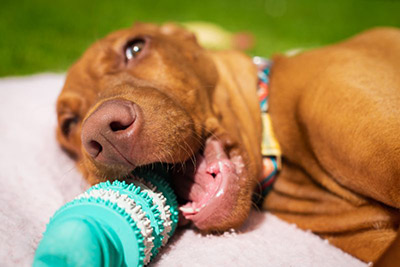Do Pet Dental Chews Really Work?

There is much ado about dental treats and chews that promise to give your pet a healthier smile and good breath. The lure to rely heavily on these treats can be tempting for pet owners who dislike the doggie halitosis and want to avoid brushing their pet’s teeth (ah, the struggle). The team at East Sacramento Veterinary Center is here to separate fact from fiction when it comes to pet dental chews, as well as recommend some ways to keep your dog’s pearly whites in great condition.
Waste of Money or Good Oral Hygiene?
Many pet owners wonder if dental chews really take the bite out of plaque and tartar in dogs. To some extent, they can help but not enough to rely heavily on them for your dog’s dental care.
There is evidence that certain dental treats can reduce some plaque and tartar buildup. However, the most effective way to keep your pet’s teeth healthy is through regular tooth brushing and veterinary dental exams and cleanings. Unfortunately, many dogs (up to two-thirds) have developed periodontal or dental disease by the time they reach 3-4 years of age.
Your best bet is to use the dental chews in conjunction with a regular dental care routine. Your veterinarian can show you how to brush your furry one’s teeth using the right toothbrush and specially formulated toothpaste for dogs.
Points to Consider About Pet Dental Treats
Before you take the plunge and decide to buy your dog an ample amount of dental treats, understand that not all treats are designed the same. Many of the cheaper brands and those made overseas are not approved by The Veterinary Oral Health Council (VOHC), which examines and approves of those chews that are proven effective.
Here are some considerations when looking for dog dental chews and considering your pet’s dental health.
- Look for the VOHC seal of approval on any selected dental chews or treats, as they recommend the manufacturers that support their product claims.
- Avoid bones or antlers because these can splinter and cause injury, as well as the possibility of causing broken or worn teeth.
- Limit the number of treats you give out. Extra calories will cause your dog to gain weight.
- Brush your pet’s teeth daily or at least a few times each week.
- Keep your pet’s annual wellness checkup with your veterinarian at East Sacramento. We will also provide a dental examination and offer recommendations.
Chew On This: We’re Here to Help
If you have any questions about pet dental treats or your dog’s oral health, please call us. We can also provide you with a few recommendations for quality dental chews that will make your fur friend smile.
